河南专升本英语:语法复习专题六-情态动词、主谓一致
专升本英语语法--主谓一致
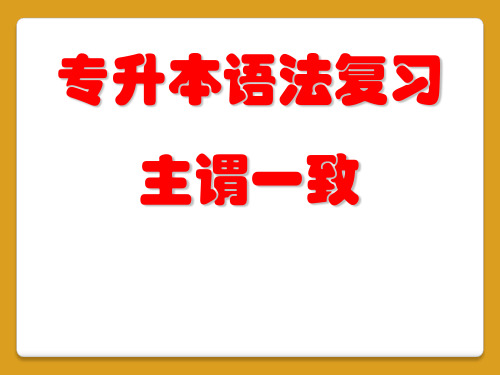
6.无生命集体名词clothing /cloth /furniture /traffic
/jewelry/luggage/poetry/equipment/machinery(机
器)/baggage做主语
is badly needed in this flooded area. e.g. 1. Clothing ____ is still increasing. 2.The number of the unemployed ____
has come are .(come) useful tools.
e.g.1.The poet and writer 2.A hammer and a saw
考点:用and连接的成对名词习惯上被看成是一个整 体, 如:bread and butter(黄油抹面包), knife and fork(刀叉)等 作主语时, 谓语动词用单数。
例: The rest of the bikes are on sale today. 剩下的自行车今天特价出售。 was eaten by the little 60% of the apple boy. 这个苹果的60%都被这个小男孩吃了。
考点一:主语中有all, half, most, the rest等, 以及 “分数或百分数+名词”做主语时,谓语动词单复 数取决于连用的名词。
is e.g. Arthritis ____a disease causing pain and swelling in the joints of the body. is Physics_____an important subject in middle schools
8. 表示时间、距离、金钱、等复数名词作主语,表达 一个整体概念时。 e.g.Twenty years has passed since he left his hometown.
河南专升本公共英语主谓一致

14. of the land in that district covered with trees and grass.(2011-30)
A. Two fifth…is Two fifths…is
B. Two fifths…are
A. have been tried
B. has been tried C. have tried D. has tried
7. Neither Mary nor her sister to the party.
A. go B. are going
C. have gone D. is going
8. More than one person been infected with the disease.
复数名词 + who/ that / which 引导的定语从句,定语从句 的谓语用单数。例如:George is one of those people who have trouble making up their minds. 乔治属于那种优柔寡 断的人。 I want to buy the one of the cars which was greatly reduced in price. 我想买那些车中唯一大减价的那辆。 (八)在 there be 结构和倒装句中,谓语通常全部或部分放在主语前面,谓语的单复数依 后面的主语而定。 例如:Where there is dirt, there are flies. 那里有垃圾,那里就有苍蝇。 On my right are many trees; on my left is a wide river. 我的右边有很多树,我的左边有条宽宽的河。 (九)“many a 或 more than one+单数名词”作主语时,谓语动词单数。 例如:Many a student loves English. 许多学生喜欢英语。 More than one example is necessary to make the students understand this rule clearly. 需要更多的例子来使学生清楚地理解这条规则。 (十)each/every+单数名词+ and+单数名词,后跟单数谓语。 例如:Every girl and boy has such a book. 每个女孩和男孩都 有这样的一本书。 专生本真题:
专升本英语语法---主谓一致
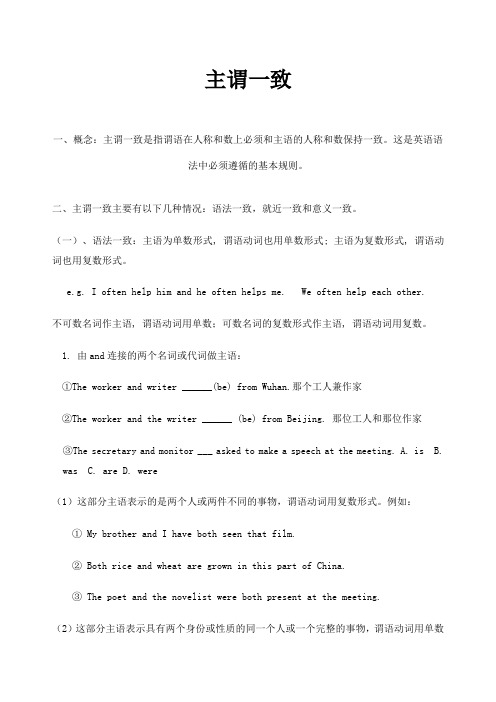
主谓一致一、概念:主谓一致是指谓语在人称和数上必须和主语的人称和数保持一致。
这是英语语法中必须遵循的基本规则。
二、主谓一致主要有以下几种情况:语法一致,就近一致和意义一致。
(一)、语法一致:主语为单数形式, 谓语动词也用单数形式; 主语为复数形式, 谓语动词也用复数形式。
e.g. I often help him and he often helps me. We often help each other.不可数名词作主语, 谓语动词用单数;可数名词的复数形式作主语, 谓语动词用复数。
1. 由and连接的两个名词或代词做主语:①The worker and writer ______(be) from Wuhan.那个工人兼作家②The worker and the writer ______ (be) from Beijing. 那位工人和那位作家③The secretary and monitor ___ asked to make a speech at the meeting. A. is B.was C. are D. were(1)这部分主语表示的是两个人或两件不同的事物,谓语动词用复数形式。
例如:① My brother and I have both seen that film.② Both rice and wheat are grown in this part of China.③ The poet and the novelist were both present at the meeting.(2)这部分主语表示具有两个身份或性质的同一个人或一个完整的事物,谓语动词用单数形式,这时 and 后面的名词前没有冠词。
例:① The st atesman and poet was engaged in warfare all his life.② War and peace is a constant theme in history.③ One more knife and fork is needed.④Bread and butter is our daily food.⑤ Law and order has been established.(3)这部分主语前面有each, every, many a, no 等修饰时,谓语动词一般用单数形式。
专升本英语主谓一致

专升本英语主谓一致在专升本英语的学习中,主谓一致是一个重要且常考的语法点。
它不仅关系到我们能否正确地表达句子的意思,还影响着我们在考试中的得分。
下面,让我们一起来深入了解一下主谓一致这个知识点。
主谓一致,简单来说,就是指主语和谓语在人称和数上要保持一致。
这听起来似乎很简单,但在实际运用中,却有许多需要注意的地方。
首先,我们来看一下语法一致原则。
这是最基本的原则,即主语是单数形式,谓语动词就用单数形式;主语是复数形式,谓语动词就用复数形式。
例如,“The book is interesting”(这本书很有趣。
)在这个句子中,主语“the book”是单数,所以谓语动词“is”也是单数。
再比如,“The books are on the shelf”(这些书在架子上。
)这里的主语“the books”是复数,谓语动词“are”也是复数。
然而,事情并非总是这么简单。
当主语后面跟有 with, together with, as well as 等短语时,谓语动词的数要与主语的数保持一致,而不是与这些短语后面的名词保持一致。
比如,“The teacher together w ith his students is going on a picnic”(老师和他的学生们正在去野餐。
)这里的主语是“the teacher”,虽然后面跟有“together with his students”,但谓语动词还是要根据“the teacher”这个单数主语来使用“is”。
接下来,我们说一说意义一致原则。
有时,主语的形式是单数,但意义是复数,或者主语形式是复数,但意义是单数,这时谓语动词的形式要根据主语的实际意义来决定。
例如,“The police are looking for the thief”(警察正在寻找那个小偷。
)“police”这个词通常是复数意义,所以谓语动词用“are”。
再看,“Maths is my favorite subject”(数学是我最喜欢的学科。
专升本英语主谓一致

可见:集体名词作主语时,谓语的数要根据主 语的意思来决定。如family, audience, crew 船员, crowd, class, company等词后,谓语 动词用复数形式时强调这个集体中的各个成员, 用单数时强调该集体的整体。例如: His family isn„t very large. 他家成员不多。 His family are music lovers. 他家个个都 是音乐爱好者。 注意:但集合名词people, police在任何情况下 都用复数形式。Are there any police around? 附近有警察吗?
5. As well as 与第一个名词一致: The students as well as the teacher were present at the meeting. I as well as they am ready to help you. 6. one+of+复数结构后的定oks that have appeared. 这是出现的最好的书之一。 但也有跟one 的情况: She is one of those women who doesn’t know a thing about English.她是丝毫不懂英语的妇女 之一。
河南专升本公共英语语法主谓一致和强调句

3. —Wasn’t it Dr. Li__D___spoke to you just now?
—Yes, it was.
A. which
B. what
C. where
D. who
75
4. Was it during the Second World War__C___he died?
A. this
句型2:It is/was+not until+被强调部分+that+其他成分 译为:“就是直到,正是直到......”
Eg: It was not until midnight that I fell asleep. It was not until he came back that I left.
A. is;which
B. was;why C. was;that
2. It was__A___he said at the meeting_____disappointed me.
D. were;how
A. what;that
B. that;that
C. what;what D. that;what
③ it 可指不知对方身份的人。 eg. -Who is knocking at the door?
-It must be Tom. (指身75份不明的人)
【课堂同步练习】
7. Tom’s mother kept telling him that he should work harder, but__D___didn’t help.
75
(2)强调句特点:把 it is/was … that / who 去掉后句子依然完整,it is/ was 后跟介词
统招专升本英语主谓一致考点
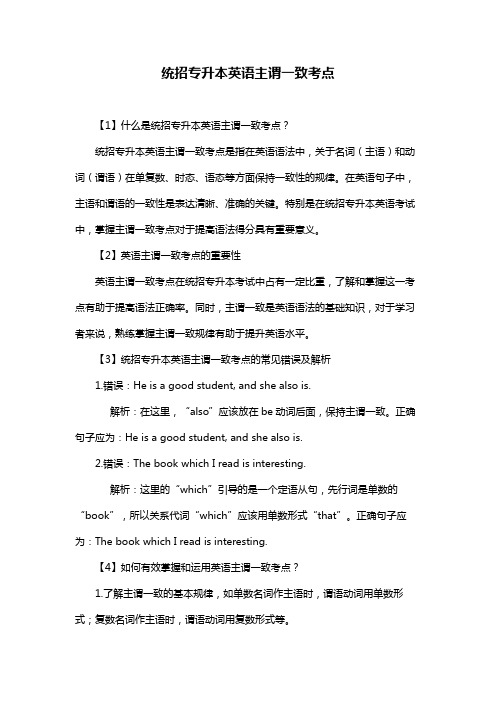
统招专升本英语主谓一致考点【1】什么是统招专升本英语主谓一致考点?统招专升本英语主谓一致考点是指在英语语法中,关于名词(主语)和动词(谓语)在单复数、时态、语态等方面保持一致性的规律。
在英语句子中,主语和谓语的一致性是表达清晰、准确的关键。
特别是在统招专升本英语考试中,掌握主谓一致考点对于提高语法得分具有重要意义。
【2】英语主谓一致考点的重要性英语主谓一致考点在统招专升本考试中占有一定比重,了解和掌握这一考点有助于提高语法正确率。
同时,主谓一致是英语语法的基础知识,对于学习者来说,熟练掌握主谓一致规律有助于提升英语水平。
【3】统招专升本英语主谓一致考点的常见错误及解析1.错误:He is a good student, and she also is.解析:在这里,“also”应该放在be动词后面,保持主谓一致。
正确句子应为:He is a good student, and she also is.2.错误:The book which I read is interesting.解析:这里的“which”引导的是一个定语从句,先行词是单数的“book”,所以关系代词“which”应该用单数形式“that”。
正确句子应为:The book which I read is interesting.【4】如何有效掌握和运用英语主谓一致考点?1.了解主谓一致的基本规律,如单数名词作主语时,谓语动词用单数形式;复数名词作主语时,谓语动词用复数形式等。
2.注意代词的单复数形式,如he、she、it变为复数形式时,分别为they、they、it。
3.掌握关系代词which、that、who的单复数用法,根据先行词的单复数选择合适的关系代词形式。
4.多做练习题,巩固所学知识。
【5】练习题及答案解析1.Question:_____ movie have you watched yesterday?A.WhatB.WhichC.WhoAnswer:BAnswer解析:此处考察主谓一致。
情态动词and主谓一致

情态动词and主谓⼀致情态动词的定义:情态动词是⼀种本⾝有⼀定的词义,表⽰说话⼈的情绪,态度或语⽓的动词,但不能单独作谓语, 只能和其他动词原形构成谓语。
We can be there on time tomorrow.我们明天能按时去那⼉。
May I have your name?我能知道你的名字吗?Shall we begin now?我们现在就开始吗?You must obey the school rules.你必须遵守校规。
情态动词数量不多,但⽤途⼴泛,主要有下列:can (could), may (might), must,mustn't , need, ought to, dare (dared), shall (should), will (would) .情态动词的位置:情态动词在句中放在谓语动词之前, 谓语动词前若有助动词,则在助动词之前,疑问句中, 情态动词则在主语之前。
I can see you. Come here。
我能看见你,过来吧。
He must have been away.他⼀定⾛了。
What can I do for you?你要什么?How dare you treat us like that!你怎能那样对待我们!情态动词的特点:情态动词⽆⼈称和数的变化, 情态动词后⾯跟的动词需⽤原形,否定式构成是在情态动词后⾯加 "not"。
个别情态动词有现在式和过去式两种形式, 过去式⽤来表达更加客⽓, 委婉的语⽓, 时态性不强, 可⽤于过去,现在或将来。
He could be here soon。
他很快就来。
We can't carry the heavy box.我们搬不动那箱⼦。
I'm sorry I can't help you。
对不起,我帮不上你。
情态动词的⽤法:can (could) 表⽰说话⼈能,可以,同意,准许,以及客观条件许可,could 为 can 的过去式。
河南专升本英语:语法复习专题六-情态动词、主谓一致

河南专升本英语:语法复习专题六-情态动词、主谓一致语法系列复习专题六-----情态动词、主谓一致情态动词一、一般疑问句中几个情态动词的问与答1. Need I/he/…?Yes,you/he/…must.(不用need)2. Must I/ he/…?No,you/ he/…needn’t/don’t(doesn’t,won’t)have to.(不用mustn’t)3. May I/ he/…?No,you/ he/…mustn’t.(少用may not)4. Could(Can)you…?Yes,I can (不用could)5. Shall I/she/ he…?No,you(she,he)needn’t/can’t/mustn’t二、情态动词表“推测”1.can,may,must使用的句式:1)肯定陈述句中:must表“肯定、必定、一定”意,may/might 表“也许,或许”意。
2)否定陈述句中:can’t/couldn’t表“不可能”意,may not/might not表“也许不、可能不”意。
3)疑问句中:只能用can或could,不能用must,may或might。
注意:表推测的could,might并不是指过去时间,而是表示比can,may把握性略小些的情况。
2.对目前状态的推测:1)must/may/might/can/could+be+表语例如:She must be a teacher.她肯定是老师。
She can’t/couldn’t be a doctor.她肯定不是医生。
He may not/might not be a doctor.他可能不是医生。
2)must/may/might/can/could+一些不能用于进行时的静态动词(如:have,exist,live,like,hate,own,belong to等)例如:She must have her own car,for she has a lot of money.That kind of bird may live in the valleys.3.对目前正在发生的事情进行推测:句式:must/may/might/can/could+be doing例如:They must be waiting for us.他们肯定正在等我们。
专转本英语:主谓一致的用法及专项练习题(附参考答案)
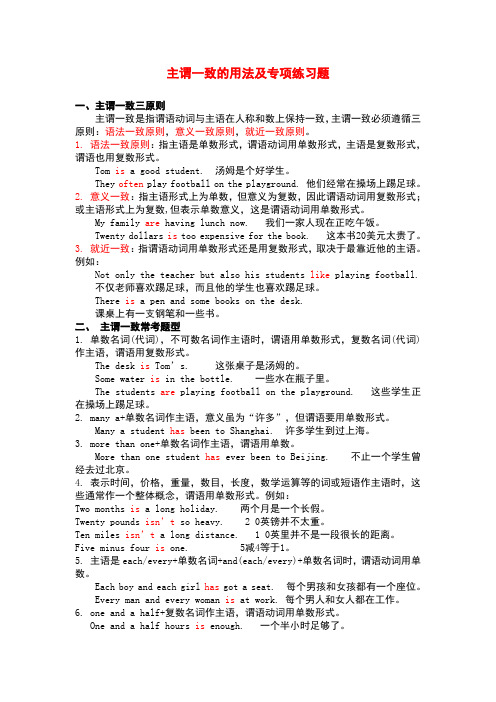
主谓一致的用法及专项练习题一、主谓一致三原则主谓一致是指谓语动词与主语在人称和数上保持一致,主谓一致必须遵循三原则:语法一致原则,意义一致原则,就近一致原则。
1.语法一致原则:指主语是单数形式,谓语动词用单数形式,主语是复数形式,谓语也用复数形式。
Tom is a good student. 汤姆是个好学生。
They often play football on the playground. 他们经常在操场上踢足球。
2.意义一致:指主语形式上为单数,但意义为复数,因此谓语动词用复数形式;或主语形式上为复数,但表示单数意义,这是谓语动词用单数形式。
My family are having lunch now. 我们一家人现在正吃午饭。
Twenty dollars is too expensive for the book. 这本书20美元太贵了。
3.就近一致:指谓语动词用单数形式还是用复数形式,取决于最靠近他的主语。
例如:Not only the teacher but also his students like playing football.不仅老师喜欢踢足球,而且他的学生也喜欢踢足球。
There is a pen and some books on the desk.课桌上有一支钢笔和一些书。
二、主谓一致常考题型1. 单数名词(代词),不可数名词作主语时,谓语用单数形式,复数名词(代词)作主语,谓语用复数形式。
The desk is Tom’s. 这张桌子是汤姆的。
Some water is in the bottle. 一些水在瓶子里。
The students are playing football on the playground. 这些学生正在操场上踢足球。
2. many a+单数名词作主语,意义虽为“许多”,但谓语要用单数形式。
Many a student has been to Shanghai. 许多学生到过上海。
英语语法:主谓一致的第一动词和情态动
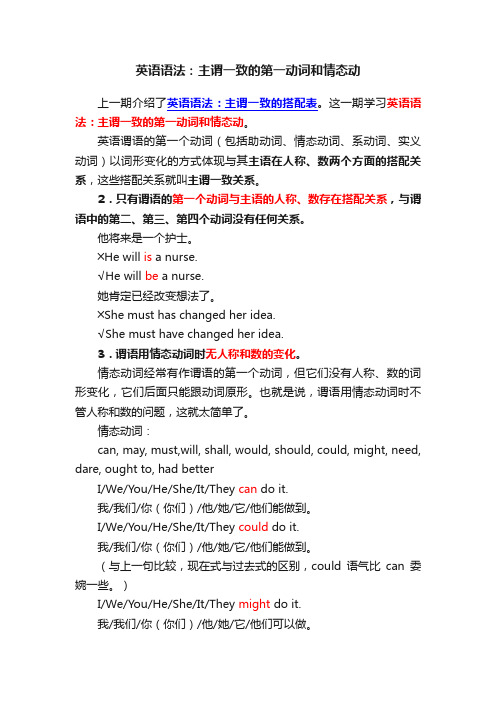
英语语法:主谓一致的第一动词和情态动上一期介绍了英语语法:主谓一致的搭配表。
这一期学习英语语法:主谓一致的第一动词和情态动。
英语谓语的第一个动词(包括助动词、情态动词、系动词、实义动词)以词形变化的方式体现与其主语在人称、数两个方面的搭配关系,这些搭配关系就叫主谓一致关系。
2.只有谓语的第一个动词与主语的人称、数存在搭配关系,与谓语中的第二、第三、第四个动词没有任何关系。
他将来是一个护士。
╳He will is a nurse.√He will be a nurse.她肯定已经改变想法了。
╳She must has changed her idea.√She must have changed her idea.3.谓语用情态动词时无人称和数的变化。
情态动词经常有作谓语的第一个动词,但它们没有人称、数的词形变化,它们后面只能跟动词原形。
也就是说,谓语用情态动词时不管人称和数的问题,这就太简单了。
情态动词:can, may, must,will, shall, would, should, could, might, need, dare, ought to, had betterI/We/You/He/She/It/They can do it.我/我们/你(你们)/他/她/它/他们能做到。
I/We/You/He/She/It/They could do it.我/我们/你(你们)/他/她/它/他们能做到。
(与上一句比较,现在式与过去式的区别,could语气比can委婉一些。
)I/We/You/He/She/It/They might do it.我/我们/你(你们)/他/她/它/他们可以做。
例句:1.We can get sick. They can get sick. They can die.【VOA Special, 2016.9】我们会生病。
动、植物也会生病。
它们会死亡。
1.So what can we, what can governments, what can companies do?【TED演讲】那么我们,政府和企业能够做些什么呢?1.You know, you could be next. It could be Denmark next. It could be Dexit.【NPR News, 2016.6】他们的国家可能成为下一个脱欧的国家。
专升本英语情态动词河南

专升本英语情态动词河南情态动词在英语中是一个非常重要的语法点,它表示的是说话人的态度或语气,包括推测、可能、需要、意愿等。
在河南的专升本英语考试中,情态动词也是一个常见的考点。
本文将重点讲解情态动词的基本用法和常见考点,以帮助考生更好地备考。
一、情态动词的基本用法情态动词有can、may、must、should、will等,它们后面跟动词原形或动词的-ing形式,表示不同的语气和含义。
下面分别介绍它们的用法:1.cancan表示能力、可能性或推测,相当于汉语中的“能够”、“可以”、“可能”。
例如:I can speak English.(我会说英语。
)It can rain tomorrow.(明天可能会下雨。
)2.maymay表示可能性或允许,相当于汉语中的“可能”、“可以”。
例如:She may come tomorrow.(她明天可能会来。
)You may go now.(你现在可以走了。
)3.mustmust表示必须或推测,相当于汉语中的“必须”、“一定”。
例如:You must finish your homework.(你必须完成作业。
)It must be raining now.(现在一定在下雨。
)4.shouldshould表示建议或应该,相当于汉语中的“应该”、“应当”。
例如:You should eat more vegetables.(你应该多吃蔬菜。
)We should arrive at 8 o’clock.(我们应当在8点到达。
)5.willwill表示意愿或将来,相当于汉语中的“愿意”、“将要”。
例如:I will help you.(我愿意帮助你。
)He will be late for work.(他将会迟到。
)二、情态动词的常见考点在河南的专升本英语考试中,情态动词的常见考点包括:情态动词的时态变化、情态动词与其他动词的搭配使用、情态动词表示推测的用法等。
下面分别进行讲解:1.情态动词的时态变化情态动词有时态的变化,包括现在时、过去时、将来时等。
专升本英语语法--主谓一致

Here comes the bus 公共汽车来了。
Here
is
a pen and some pieces of paper for you.
给你一支钢笔和几张纸。
强化练习
D 1.He is the only one of the students who ____ a winner of scholarship for three years. A. is B. are C. have been D. has been 2.Mary is one of those people who raise pets. 玛丽是饲养宠物者之一。
专升本语法复习 主谓一致
在英语句子里,谓语受主语支配,其动 词必须和主语在人称和数上保持一致, 这就叫主谓一致。寻其规律,大致可 归纳为三个原则,即语法一致、逻辑
意义一致和就近一致原则。
语法一致 意义一致
就近一致
• 主语为单数,谓语用单数;主语为复数, 谓语也用复数
• 不取决于语法上的单复数形式,取决于 主语的单复数意义。(一些集体名词作 主语) • Family/ government/public class/audience /committee
例: The rest of the bikes are on sale today. 剩下的自行车今天特价出售。 was eaten by the little 60% of the apple boy. 这个苹果的60%都被这个小男孩吃了。
考点一:主语中有all, half, most, the rest等, 以及 “分数或百分数+名词”做主语时,谓语动词单复 数取决于连用的名词。
6.无生命集体名词clothing /cloth /furniture /traffic
专升本英语语法--主谓一致共29页文档
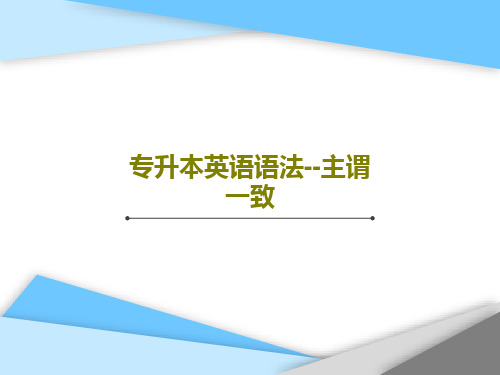
谢谢你的阅读
❖ 知识就是财富 ❖ 丰富你的人生
71、既然我已经踏上这条道路,那么,任何东西都不应妨碍我沿着这条路走下去。——康德 72、家庭成为快乐的种子在外也不致成为障碍物但在旅行之际却是夜间的伴侣。——西塞罗 73、坚持意志伟大的事业需要始终不渝的精神。——伏尔泰 74、路漫漫其修道远,吾将上下而求索。——屈原 75、内外相应,言行相称。——韩非
专升本英语语法--主谓 一致
6、纪律是自由的第一条件。——黑格 尔 7、纪律是集体的面貌,集体的声音, 集体的 动作, 集体的 表情, 集体的 信念。 ——马 卡连柯
8、我们现在必须完全保持党的纪律, 否则一 切都会 陷水。— —夸美 纽斯
10、一个人应该:活泼而守纪律,天 真而不 幼稚, 勇敢而 鲁莽, 倔强而 有原则 ,热情 而不冲 动,乐 观而不 盲目。 ——马 克思
主谓一致练习题讲解专升本

主谓一致练习题讲解专升本### 主谓一致练习题讲解专升本在英语语法中,主谓一致是一个重要的概念,它要求句子中的主语和谓语在数上保持一致。
为了帮助专升本的同学们更好地掌握这一知识点,我们准备了一些练习题,并附上了详细的讲解。
#### 1. 单数主语与单数谓语当主语是单数形式时,谓语也应使用单数形式。
例如:- 练习题:The book is on the table.- 讲解:这里的主语是 "The book",是单数形式,因此谓语动词"is" 也使用单数形式。
#### 2. 复数主语与复数谓语当主语是复数形式时,谓语也应使用复数形式。
例如:- 练习题:The students are in the classroom.- 讲解:这里的主语是 "The students",是复数形式,因此谓语动词"are" 也使用复数形式。
#### 3. 集合名词作主语集合名词如 "family"、"team" 等,虽然指的是一个整体,但通常被视为复数。
例如:- 练习题:My family are having dinner.- 讲解:虽然 "family" 指的是一个整体,但在这里它被当作复数,因此谓语动词 "are" 使用复数形式。
#### 4. 不定代词作主语不定代词如 "everyone"、"something" 等,虽然形式上是单数,但通常被视为单数。
例如:- 练习题:Everyone is responsible for their own actions.- 讲解:"Everyone" 虽然是单数形式,但在这里它被当作单数,因此谓语动词 "is" 使用单数形式。
#### 5. 主语与谓语之间的介词短语当主语和谓语之间有介词短语时,谓语应与前面的主语保持一致。
主谓一致、情态动词讲解
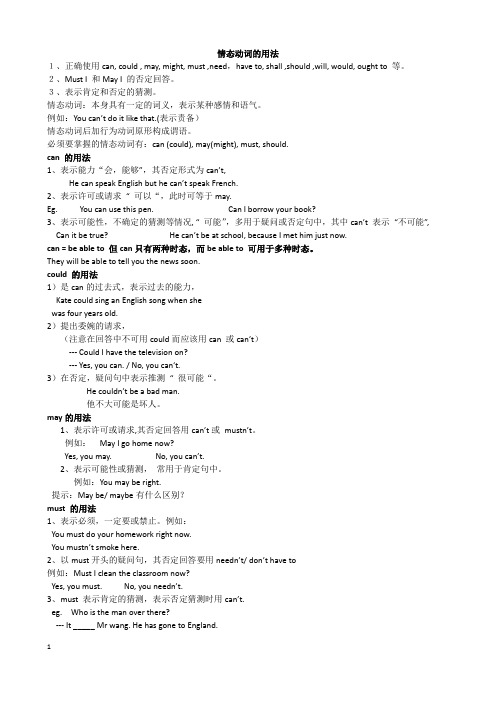
情态动词的用法1、正确使用can, could , may, might, must ,need,have to, shall ,should ,will, would, ought to 等。
2、Must I 和May I 的否定回答。
3、表示肯定和否定的猜测。
情态动词:本身具有一定的词义,表示某种感情和语气。
例如:You can’t do it like that.(表示责备)情态动词后加行为动词原形构成谓语。
必须要掌握的情态动词有:can (could), may(might), must, should.can 的用法1、表示能力“会,能够”,其否定形式为can’t,He can speak English but he can’t speak French.2、表示许可或请求“ 可以“,此时可等于may.Eg. You can use this pen. Can I borrow your book?3、表示可能性,不确定的猜测等情况, “ 可能”,多用于疑问或否定句中,其中can’t 表示“不可能”, Can it be true? He can’t be at school, because I met him just now.can = be able to 但can只有两种时态,而be able to 可用于多种时态。
They will be able to tell you the news soon.could 的用法1)是can的过去式,表示过去的能力,Kate could sing an English song when shewas four years old.2)提出委婉的请求,(注意在回答中不可用could而应该用can 或can’t)--- Could I have the television on?--- Yes, you can. / No, you can‘t.3)在否定,疑问句中表示推测“ 很可能“。
河南专升本英语考点-主谓一致

一、“Either A or B+谓语”结构,谓语取决于B。
例:Either the students or their teacher dislikes basketball,otherwise theywould take part in the basketball match.但在一般疑问句中,谓语取决于A。
例如:Do either the students or their teacher dislike basketball?Is either he or you going there?这种谓语取决于与其最近的主语现象叫做“就近原则”。
二、“Neither A nor B+谓语”结构,谓语多取决于B。
但现代英语也出现复数谓语,理由是neither A nor B是两部分之和,为复数概念,故其后可用复数谓语。
例如:Neither she nor I was(或were)fortunate enough to gain extra points. 她和我都不幸未能获得附加分。
Neither you nor he does(或do)well in maths.三、Neither of…接单、复谓(通常视为单数,但在口语中,从意义上亦可视为复数)None of…接单、复谓例:Neither of them is(或are)right.None of you is(或are)fit for the job.四、 There be 结构中be的形式取决于靠近be的名词,若是单数名词,则be 为is/was;若是复数名词,则be为are/were(即第1条中的“就近原则”)。
例如:There is a desk,two chairs and three sofas in the room.There are three sofas,two chairs and a desk in the room.五、a group of…,a team of…后跟复谓、单谓皆可,跟复谓的理由是不止一个人,跟单谓的理由是将许多人视为“一组”、“一队”这样的一个单位体。
英语专升本语法主谓一致
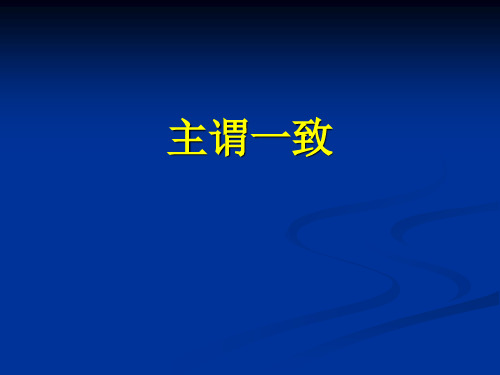
Your trousers are torn.You'd better change them.
你的裤子破了,最好换一条。
One pair of trousers is not enough.一条裤 子是不够的。
Here are some new pairs of trousers.这儿 有几条新裤子。
B. is causing
C. are caused
D. is caused
定语从句中的主谓一致问题
one of + 复数名词+ 定语从句: 1. 定语从句的先行词通常是这个“复数名词”, 因此从句的谓语用复数形式。
This is one of the best novels that have appeared this year . 这是今年出版的最佳小说之一。(关系词 “that”代“novels”) He was one of the boys who were praised . 他是受表扬的男孩之一。
Our family is a happy one . 我们有个幸福的家庭。
The family are early risers . 这家人都起得早。
The public are (is )requested not to litter . 请公众不要乱扔废弃物。
Hale Waihona Puke 有些名词以s结尾,看似名词复数, 实
The clippings of the hedges are usually burnt. 由篱笆上剪下的枝叶通常烧掉。
The sweepings of the godown have been disposed of. 仓库垃圾已经清除。
其他以-s结尾的名词:
河南专升本英语语法

河南专升本英语语法
河南专升本英语语法考试主要考察学生对英语基础语法的掌握程度,考试难度相当于大学英语四级的水平。
以下是河南专升本英语语法考试中常见的一些语法知识点:
1. 时态和语态:包括一般现在时、一般过去时、现在进行时、过去进行时、将来时(包括will和be going to)、被动语态等。
2. 虚拟语气:包括与现在事实相反、与过去事实相反、与将来事实相反的虚拟语气。
3. 非谓语动词:包括动词不定式、动名词和分词等。
4. 从句:包括名词性从句(主语从句、宾语从句、表语从句)、定语从句和状语从句等。
5. 倒装句:包括部分倒装和完全倒装。
6. 强调句:包括强调谓语、强调主语和强调宾语等。
7. 主谓一致:包括单数主语和复数主语的情况。
8. 情态动词:包括can、could、may、might、must、need等情态动词的用法。
9. 介词和连词:包括常用介词和连词的用法,如in、on、at、for等。
10. 形容词和副词:包括形容词和副词的比较级和最高级的用法,以及修饰名词和修饰动词的情况。
以上是河南专升本英语语法考试中常见的一些知识点,备考时可以结合真题进行练习,掌握常见的考点和题型,提高自己的语法水平。
主谓一致、强调句和倒装句、情态动词和虚拟语气讲解以及习题详细解析
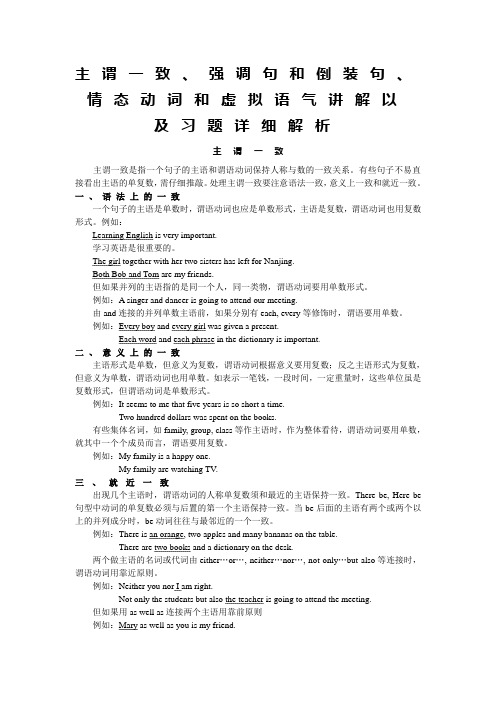
主谓一致、强调句和倒装句、情态动词和虚拟语气讲解以及习题详细解析主谓一致主谓一致是指一个句子的主语和谓语动词保持人称与数的一致关系。
有些句子不易直接看出主语的单复数,需仔细推敲。
处理主谓一致要注意语法一致,意义上一致和就近一致。
一、语法上的一致一个句子的主语是单数时,谓语动词也应是单数形式,主语是复数,谓语动词也用复数形式。
例如:Learning English is very important.学习英语是很重要的。
The girl together with her two sisters has left for Nanjing.Both Bob and Tom are my friends.但如果并列的主语指的是同一个人,同一类物,谓语动词要用单数形式。
例如:A singer and dancer is going to attend our meeting.由and连接的并列单数主语前,如果分别有each, every等修饰时,谓语要用单数。
例如:Every boy and every girl was given a present.Each word and each phrase in the dictionary is important.二、意义上的一致主语形式是单数,但意义为复数,谓语动词根据意义要用复数;反之主语形式为复数,但意义为单数,谓语动词也用单数。
如表示一笔钱,一段时间,一定重量时,这些单位虽是复数形式,但谓语动词是单数形式。
例如:It seems to me that five years is so short a time.Two hundred dollars was spent on the books.有些集体名词,如family, group, class等作主语时,作为整体看待,谓语动词要用单数,就其中一个个成员而言,谓语要用复数。
例如:My family is a happy one.My family are watching TV.三、就近一致出现几个主语时,谓语动词的人称单复数须和最近的主语保持一致。
- 1、下载文档前请自行甄别文档内容的完整性,平台不提供额外的编辑、内容补充、找答案等附加服务。
- 2、"仅部分预览"的文档,不可在线预览部分如存在完整性等问题,可反馈申请退款(可完整预览的文档不适用该条件!)。
- 3、如文档侵犯您的权益,请联系客服反馈,我们会尽快为您处理(人工客服工作时间:9:00-18:30)。
语法系列复习专题六-----情态动词、主谓一致情态动词一、一般疑问句中几个情态动词的问与答1. Need I/he/…?Yes,you/he/…must.(不用need)2. Must I/ he/…?No,you/ he/…needn’t/don’t(doesn’t,won’t)have to.(不用mustn’t)3. May I/ he/…?No,you/ he/…mustn’t.(少用may not)4. Could(Can)you…?Yes,I can (不用could)5. Shall I/she/ he…?No,you(she,he)needn’t/can’t/mustn’t二、情态动词表“推测”1.can,may,must使用的句式:1)肯定陈述句中:must表“肯定、必定、一定”意,may/might表“也许,或许”意。
2)否定陈述句中:can’t/couldn’t表“不可能”意,may not/might not表“也许不、可能不”意。
3)疑问句中:只能用can或could,不能用must,may或might。
注意:表推测的could,might并不是指过去时间,而是表示比can,may把握性略小些的情况。
2.对目前状态的推测:1)must/may/might/can/could+be+表语例如:She must be a teacher.她肯定是老师。
She can’t/couldn’t be a doctor.她肯定不是医生。
He may not/might not be a doctor.他可能不是医生。
2)must/may/might/can/could+一些不能用于进行时的静态动词(如:have,exist,live,like,hate,own,belong to等)例如:She must have her own car,for she has a lot of money.That kind of bird may live in the valleys.3.对目前正在发生的事情进行推测:句式:must/may/might/can/could+be doing例如:They must be waiting for us.他们肯定正在等我们。
She may/might be doing her homework.她可能正在做作业。
Can/Could he be playing football?他会正在踢足球吗?4.对已发生的事情进行推测:句式:must/may/might/can/could+have done例如:There’s no lignt in the room. They must have gone to bed./She knows nothing about the film. She can’t/couldn’t have seen it./Can/Could he have been a doctor?/He may/might(not)have been a teacher./They must have been watching TV at nine last night./Can/Could she have stayed in Beijing last year?注意:will have done句式也可表“肯定/可能已经…”推测意。
例如:He will have learned advanced mathematics,for he knows a lot about it. 他肯定/可能学过高等数学,因为他对此懂得很多。
三、“情态动词+have done”用法1.should/ought to +have done,意“本应该…”,含有责备或后悔意。
例如:You should have come here a little earlier./I ought to have sent him to school./ 2.shouldn’t/oughtn’t to+have done,意“本不应该”,含有责备或后悔意。
例如:You shouldn’t have watered the flower./I oughtn’t to have scolded her for such a small thing.3.might have done,意“过去可能做”;could have done意“本能够做”,两者都含有委婉批评或遗憾之意,也可表对过去情况的推测。
例如:He might have gone to Nanjing with Professor st week,but he was ill.上星期他本可以和王教授一起去南京的,可他病了。
We could have finished the work ahead of time.我们本来是能够提前完成工作的。
四、情态动词在反意疑问句中的用法1.“肯定祈使句+附加问句”结构,附加问句常用will/would/won’t you形式。
例如:Stand still,will/would/won’t you?2.“否定祈使句+附加问句”结构,附加问句常用will/would you形式。
例如:Don’t watch TV,will/would you?3.Let’s…,shall we? ; Let us…,will/won’t you?4.含有must句子的反意问句1)must表示“必须”时,附加部分常用needn’t,也可用mustn’t.例如:He must go with you,needn’t/mustn’t he?2)mustn’t表“一定不能”时,附加部分用may.例如:She mustn’t leave,may she?3)must表“一定、想必”推测意时,附加部分主要有下列几种形式:A.He must be an engineer,isn’t he?They must be writing now,aren’t they?(这类句子问句前部分含“must be…”或“must be doing…”。
)B.She must have a car/live there, doesn’t she?C.He must have seen the film,hasn’t he?(这类句子问句前部分的谓语为must have done,句子无具体过去时间状语。
)D.He must have seen the film last week,didn’t he?(这类句子问句前面部分的谓语为must have done,句子有具体过去时间状语。
)E.Mother must have been shopping then,wasn’t she?(前面部分谓语为must have been doing。
)5.含有may表推测的句子,其反意问句形式与must表推测的反意问句形式相似。
例如:She may have finished her homework,hasn’t she?五、几组词语辨析1.must与have to:must强调说话者的主观看法,have to强调客观需要,表示“不必”意要用needn’t 或don’t/didn’t/won’t have to,不能用mustn’t。
2.can/could与be able to:can多用于现在时,也可用于将来时,could只用于过去时,be able to 可用于各种时态。
表示“过去经过努力而做成(或没做成)”要用was/were(not) able to ,而不用could(not)。
例如:He worked hard,but he wasn’t able to pass the exam.3.will,would,used to:都可表“习惯”意。
①will表示不受时间限制的习惯性动作。
如:Fish will die out of water./ She’ll sit for hours without saying anything.②would表示过去习惯性的动作,但不涉及与现在情况的对比。
如:He would walk by the river in the morning.注意:would后不能跟表状态动词。
例如不能说He would be late for school last year. ③used to表示过去习惯性的动作或状态,但这种习惯现在已不存在了。
如:He used to get up early. He used to be late for school.情态动词考点分析1.-Could I borrow your dictionary?-Yes,of course you________.A.mightB.willC.canD.should析:B、D意明显不合;A语气不妥,与of course不符。
此题Could是表Can意的委婉说法,并非过去时,所以答案应为C。
2.-Shall I tell John about it?-No,you_________.I’ve told him already.A.needn’tB.wouldn’tC.mustn’tD.shoudn’t析:B意明显不合用,可排除。
mustn’t意“不许、不得”,shouldn’t意“不应该”都不合情景。
只有needn’t表“不必”与下文“I’ve told him already”相贴切。
3.-There were already five people in the car,but they managed to take me as well.-It_________a comfortable journey.A.can’t beB.shouldn’t beC.mustn’t have beenD.couldn’t have been析:A、B是对现在情况而言,与情景不合。
表否定推测不能说mustn’t have been,只有D选项“不可能是”意思切合,时态也对,故为正确答案。
4.The fire spread through the hotel very quickly ,but everyone________get out.A.couldB.wouldC.was able toD.had to析:根据题干提供的情景B、D皆应排除。
在A、C两选项中,因为根据情景要选一个“经过努力能够”这样意思的词,故定答案为C。
5.I told Sally how to get here,but perhaps I________for her.A.had to write it outB.must have written it outC.should have written it outD.ought to write it out析:A项意“(当时)不得不写出来”,不合题意;D项意“(现在)应写出来”也不合题意;B项意“(当时)肯定已写出来”明显不对。
